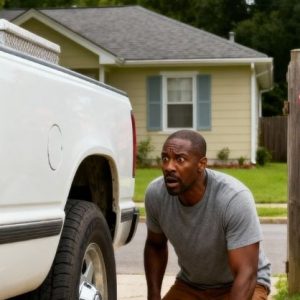
Rain drifted across the cobblestone streets of Ashford Vale, a quiet town tucked between hills and river mist. In a small apartment above a bakery, Mara Linwood sat before her mirror, tracing the outline of the dark birthmark that covered the left side of her face. The glass had never been kind to her. It showed what others saw first and never forgot.
She had grown used to the whispers. Some people pretended not to stare; others didn’t bother. Children sometimes called her names before running off in laughter. Over time, Mara stopped crying. She simply grew still, like a pond after too many stones have been thrown into it.
By the time she turned thirty, she had accepted a quiet life. Her mother’s health was fading, and their little shop that sold pressed flowers barely earned enough to keep them warm through winter. Mara worked silently, her hands smelling of lavender and rainwater.
Then, one bright morning in late March, a man stepped into the shop, tapping his cane gently against the floorboards.
“Good morning,” he said. His voice was calm, low, with a trace of warmth that caught her off guard.
Mara looked up. The stranger’s eyes were pale and unfocused. He was blind.
“I hope I’m not interrupting,” he continued. “I could smell your flowers from down the street. They reminded me of something I can’t name.”
“You’re not interrupting,” Mara said softly. “What kind would you like?”
“Whichever you think belongs to someone who believes in beginnings,” he said with a small smile.
That first conversation lasted far longer than the time it took to buy flowers. His name was Rowan Dacre, and he came back the next day. And the next. Sometimes to talk about music, sometimes about the way seasons changed, always asking about her mother. Mara, unused to kindness, began to wait for his visits.
The town soon noticed. People whispered about the blind man who seemed not to realize what she looked like. Some pitied him. Others mocked her luck.

One afternoon, as sunlight spilled through the glass window, Rowan stood before her holding a single blue iris. “Mara,” he said gently, “you’ve filled my days with colors I thought I’d lost. Will you let me share the rest of my life with you?”
Her throat tightened. “You don’t know what you’re asking,” she whispered. “You don’t know my face.”
He reached out, brushing his fingers lightly across her palm. “I don’t need sight to know where beauty lives.”
They were married in the garden behind her shop, surrounded by lilacs and gossip. The ceremony was small, the whispers loud. Yet Rowan never flinched.
That night, after the guests were gone, Mara stood by the window, her reflection flickering in the dark glass. She felt the old fear rising—the terror that he would someday see her and recoil.
Rowan approached her, carrying a folded letter. “There’s something I’ve wanted to tell you,” he said.
She turned, uneasy. “What is it?”
“It’s about how I lost my sight.” He handed her the paper, written in a doctor’s careful script. “I was a paramedic once. Five years ago, I ran into a burning warehouse to save a boy trapped inside. He lived. I didn’t come out the same.”
Her eyes filled with tears. “I didn’t know.”
He smiled faintly. “It was the day I began to understand that seeing isn’t the same as knowing. Since then, I’ve learned to read people by their voices, their silences. That’s how I found you.”
Then he reached up, his hands trembling slightly as they touched her face. His fingers traced the edge of the birthmark, not with hesitation but tenderness.
“This,” he said quietly, “is part of the woman I love.”
Mara couldn’t speak. Years of shame melted into the tears that slid down her cheeks. Rowan held her until she stopped shaking.
But peace never came easily in Ashford Vale. A week later, she overheard two women outside the bakery.
“He’ll leave her when he realizes what she looks like,” one said.
Mara’s heart broke all over again. Rowan only squeezed her hand when he heard. “Let them talk,” he said. “They don’t understand that I’ve already seen you—more clearly than they ever will.”
Months passed. Then one morning, a letter arrived from a hospital in the city. A new surgery could restore partial vision. Mara felt both hope and dread twist inside her.
When she told Rowan, he smiled. “If it works,” he said, “the first thing I want to see is you.”
She almost begged him not to do it, but she couldn’t stand between him and the chance to reclaim light.
The day the bandages were removed, Mara waited at his bedside, her hands trembling. The doctor whispered something, and Rowan slowly opened his eyes.
At first, only light. Then shape. Then her.

Mara turned away, ready for disappointment. But his voice came, soft and shaking. “Mara,” he said, “you’re lovelier than I ever imagined.”
She turned back to him, tears spilling freely. “You can see me?”
“Not perfectly,” he said, smiling. “But enough to know that I was right all along.”
The nurses wiped their eyes. Mara fell into his arms, laughing and crying at once.
From that day, people in Ashford Vale stopped seeing the mark on her face. They saw instead the light that came from within her.
And every year on their anniversary, Rowan would touch her cheek and whisper, “I once thought I’d never see beauty again. Then I found you.”
Mara no longer feared mirrors. Because now, when she looked, she didn’t see the birthmark. She saw love that had learned to see without eyes—and never forgot how.




